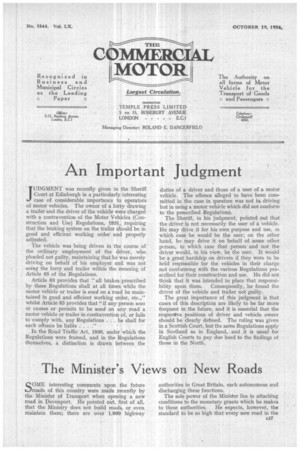An Important Judgment
Page 39

If you've noticed an error in this article please click here to report it so we can fix it.
JUDGMENT was recently given in the Sheriff Court at Edinburgh in a particularly interesting case of considerable importance to operators of motor vehicles. The owner of a lorry drawing a trailer and the driver of the vehicle were charged with a contravention of the Motor Vehicles (Construction and Use) Regulations, 1931, requiring that the braking system on the trailer should be in good and efficient working order and properly adjusted.
The vehicle was being driven in the course of the ordinary employment of the driver, who pleaded not guilty, maintaining that he was merely driving on behalf of his employer and was not using the lorry and trailer within the meaning of Article 85 of the Regulations.
Article 63 provides that "all brakes prescribed by these Regulations shall at all times while the motor vehicle or trailer is used on a road be maintained in good and efficient working order, etc.," whilst Article 85 provides that "if any person uses or causes or permits to be used on any road a motor vehicle or trailer in contravention of, or fails to comply with, any Regulations . . . he shall for each offence be liable . . . ." • . .
In the Road Traffic Act, 1930, under 'which the Regulations were framed, and in the Regulations themselves, a distinction is drawn between the duties of a driver and those of a user of a motor vehicle. The offence alleged to have been committed in the case in question was not in driving but in using a motor vehicle which did not conform to the prescribed Regulations.
The Sheriff, in his judgment, pointed out that the driver is not necessarily the user of a vehicle. He may drive it for his own purpose and use, in which case he would be the user; on the other hand, he may drive it on behalf of some other person, in which case that person and not the driver would, in his view, be the user. It would be a great hardship on drivers if they were to be held responsible for the vehicles in their charge not conforming with the various Regulations prescribed for their construction and use. He did not think that it was intended to place that responsibility upon them. Consequently, he found the driver of the vehicle and trailer not guilty.
The great importance of this judgment is that cases of this description are likely to be far more frequent in the future, and it is essential that the respective positions of driver and vehicle owner should be clearly defined. The ruling was given in a Scottish Court, but the same Regulations apply in Scotland as in England, and it is usual for English Courts to pay due heed to the findings of those in the North.












































































































